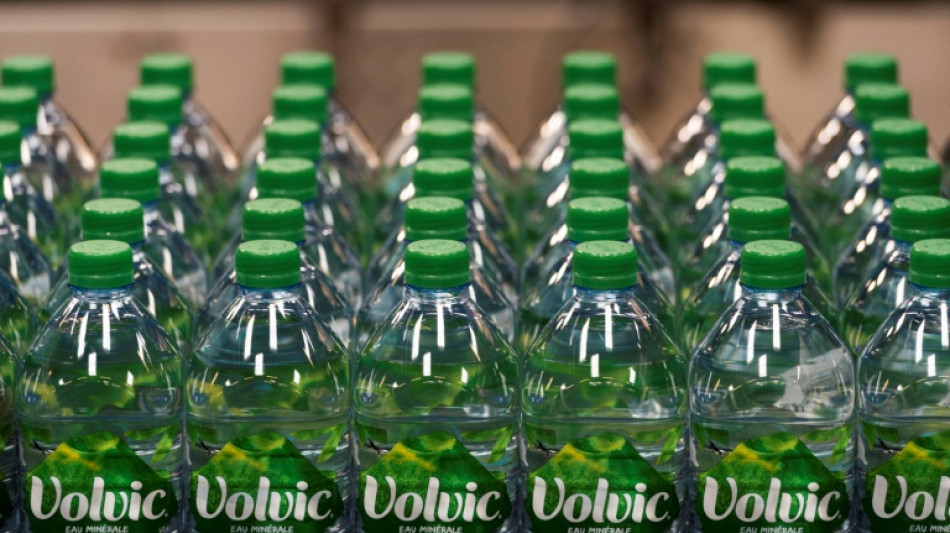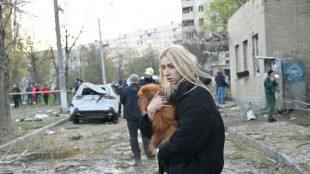
-
 SFWJ / Medcana Announces Strategic Expansion Into Australia With Acquisition of Cannabis Import and Distribution Licenses
SFWJ / Medcana Announces Strategic Expansion Into Australia With Acquisition of Cannabis Import and Distribution Licenses
-
US to withdraw some 1,000 troops from Syria

-
 Four killed after spring storms wreak havoc in the Alps
Four killed after spring storms wreak havoc in the Alps
-
Spurs' Popovich reportedly home and well after 'medical incident'

-
 Trump goes to war with the Fed
Trump goes to war with the Fed
-
Celtics chase second straight NBA title in playoff field led by Thunder, Cavs

-
 White House site blames China for Covid-19 'lab leak'
White House site blames China for Covid-19 'lab leak'
-
Norris edges Piastri as McLaren top Jeddah practice

-
 Trump warns US could ditch Ukraine talks if no progress
Trump warns US could ditch Ukraine talks if no progress
-
Judge denies Sean 'Diddy' Combs push to delay trial

-
 80 killed in deadliest US attack on Yemen, Huthis say
80 killed in deadliest US attack on Yemen, Huthis say
-
Lebanon says two killed in Israeli strikes in south

-
 Trump says US will soon 'take a pass' if no Ukraine deal
Trump says US will soon 'take a pass' if no Ukraine deal
-
F1 success is 'like cooking' - Ferrari head chef Vasseur

-
 Cycling mulls slowing bikes to make road racing safer
Cycling mulls slowing bikes to make road racing safer
-
Macron invites foreign researchers to 'choose France'

-
 Klopp 'happy' in new job despite Real Madrid rumours: agent
Klopp 'happy' in new job despite Real Madrid rumours: agent
-
Alcaraz into Barcelona semis as defending champion Ruud exits

-
 Vance meets Italy's Meloni before Easter at the Vatican
Vance meets Italy's Meloni before Easter at the Vatican
-
Evenepoel returns with victory in Brabantse Pijl

-
 Maresca confident he will survive Chelsea slump
Maresca confident he will survive Chelsea slump
-
Mob beats to death man from persecuted Pakistan minority

-
 Lebanon says one killed in Israeli strike near Sidon
Lebanon says one killed in Israeli strike near Sidon
-
Arsenal's Havertz could return for Champions League final

-
 US officials split on Ukraine truce prospects
US officials split on Ukraine truce prospects
-
Client brain-dead after Paris cryotherapy session goes wrong

-
 Flick demands answers from La Liga for 'joke' schedule
Flick demands answers from La Liga for 'joke' schedule
-
'Maddest game' sums up Man Utd career for Maguire

-
 Trial opens for students, journalists over Istanbul protests
Trial opens for students, journalists over Istanbul protests
-
Gaza rescuers say Israeli strikes kill 24 after Hamas rejects truce proposal

-
 'Really stuck': Ukraine's EU accession drive stumbles
'Really stuck': Ukraine's EU accession drive stumbles
-
'Not the time to discuss future', says Alonso amid Real Madrid links

-
 74 killed in deadliest US attack on Yemen, Huthis say
74 killed in deadliest US attack on Yemen, Huthis say
-
Southgate's ex-assistant Holland fired by Japan's Yokohama

-
 Vance meets Meloni in Rome before Easter at the Vatican
Vance meets Meloni in Rome before Easter at the Vatican
-
Ryan Gosling to star in new 'Star Wars' film

-
 Hamas calls for pressure to end Israel's aid block on Gaza
Hamas calls for pressure to end Israel's aid block on Gaza
-
Russia says Ukraine energy truce over, US mulls peace talks exit

-
 58 killed in deadliest US strike on Yemen, Huthis say
58 killed in deadliest US strike on Yemen, Huthis say
-
Museums rethink how the Holocaust should be shown

-
 Three dead after deadly spring storm wreaks havoc in the Alps
Three dead after deadly spring storm wreaks havoc in the Alps
-
No need for big changes at Liverpool, says Slot

-
 Bloody Philippine passion play sees final performance of veteran 'Jesus'
Bloody Philippine passion play sees final performance of veteran 'Jesus'
-
New US envoy prays, delivers Trump 'peace' message at Western Wall

-
 Postecoglou sticking around 'a little longer' as Spurs show fight in Frankfurt
Postecoglou sticking around 'a little longer' as Spurs show fight in Frankfurt
-
US threatens to withdraw from Ukraine talks if no progress

-
 Tears and defiance in Sumy as Russia batters Ukraine border city
Tears and defiance in Sumy as Russia batters Ukraine border city
-
Russia rains missiles on Ukraine as US mulls ending truce efforts

-
 Tokyo leads gains in most Asian markets on trade deal hopes
Tokyo leads gains in most Asian markets on trade deal hopes
-
Two missing after deadly spring snowstorm wreaks havoc in the Alps


Volvic on front line of France's new water fears
The public fountains in Volvic, the home of one of the world's most famous mineral waters, have been turned off.
Just down the road from the bottling factory at the foot of the old volcanic hills of central France, streams once powerful enough to drive flour mills are drying up and villages are under a hosepipe ban.
Campaigners such as Sylvie de Larouziere, head of the water conservation group PREVA, point the finger at the Volvic plant. "It seems like it's always getting bigger," she complained.
A local aristocratic trout farmer is suing the company, owned by French multinational Danone, after a stream that fed his 17th-century fish ponds abruptly dried up.
The Puy de Dome region is sometimes called the "water tower" of France, with heavy and reliable rainfall meaning farmers downstream used to slosh around in their fields because the soil was so wet.
But those days are long gone. In early May with supplies "abnormally weak", authorities imposed a hosepipe ban and outlawed the filling of swimming pools in 31 nearby districts, hitting some 60,000 people.
Volvic's public fountains were switched off and villagers fear water cuts this summer.
"It was a shock," said Maria-Louisa Borges, a retired cleaner who has lived in Volvic for 50 years. "We're just coming out of winter."
The restrictions, affecting somewhere so famous for its abundant water, underline the worsening strains on supplies in France and the competing demands for an increasingly rare resource.
Two-thirds of the country's water tables are below normal, Environment Minister Christophe Bechu said last week as he voiced "very serious concerns".
But it also raises questions about the future of France's enormous mineral water industry, already decried by environmentalists for the hundreds of billions of plastic bottles it produces annually.
France is both the world's biggest exporter of bottled water and the home of its most famous brands from Volvic to Evian, Vittel to Perrier.
- 'Critical state' -
For decades, experts have been warning about the risk to global fresh water supplies posed by climate change, population growth, and over-consumption.
Problems have been gathering in France, though mostly beyond the public eye. But this winter, the country went a record 32 days without rainfall, from January 21 to February 21. Even villages in the foothills of the snow-topped Pyrenees mountains are having to be supplied by truck.
The dry winter followed punishing heat last summer with months of drought and high temperatures parching even the normally lush Alps and rendering mighty rivers like the Rhine unpassable for barges.
President Emmanuel Macron said it spelled "the end of abundance".
"Climate change is adding to an already degraded situation, with long droughts, heatwaves but also winter droughts," former French environment minister and a Green MP, Delphine Batho, told AFP. "That's leading to a critical state for drinking water."
In a sign of conflicts experts anticipate in future, activists opposed to farmers building rainwater-capture facilities in Batho's constituency in western France clashed violently with security forces in March.
Two protesters were left in a coma.
- Rain shortfall? -
No blows are being traded in Volvic, but fears are growing. Similar tensions are playing out in the eastern Vosges region, where Nestle-owned Vittel is accused of over-exploiting the water table.
Other disputes between water companies and locals have occurred as far afield as Mexico, California and Fiji.
"Sending water to the other side of the world while we die of thirst here? It bothers me," said Jose da Silva, a 69-year-old who worked for 30 years at the Volvic plant.
"They try to claim it's not the same source (as for the drinking water), but I'm not convinced," he told AFP.
The Volvic brand has been around since 1935, the water naturally filtered through a granite-lined volcanic basin in a process that takes five years, according to the company.
Pumping has rocketed from around 200,000 litres a year in 1950 to 1.7 billion litres in 2020, according to its own figures.
Yet Volvic is exempt from the latest water restrictions imposed on locals. The company, however, has pledged to respect a five-percent reduction of its extraction limit of 2.8 billion litres.
Given that it is currently withdrawing less than the limit, campaigners say the pledge makes no difference.
But the company insists it only uses 22 percent of the local water, with 50 percent taken by the public water system.
"Undertaken downstream from the drinking water source, the activities of Volvic do not have an impact on the availability in the drinking water system of the area," it said in a statement.
The local government prefect's office, which sets the annual quota for Volvic, also denied any link between the company and the water restrictions.
It blamed a shortfall in rain, saying it was 24 percent below average in 2022.
The water use restrictions were "preventative and aim to reduce consumption in order to avoid bigger supply tensions", it said.
- Legal fight -
But PREVA and another local group, Marsat, suspect the six deep wells used by Danone are drawing down the level of Volvic's aquifer.
Trout farmer Edouard de Feligonde has spent four years suing the French state for 32 million euros ($35 million) and taking Volvic to court to recover losses caused by his water source drying up.
He is confident an expert report ordered by a judge last year will validate his findings that show Danone is to blame.
"At the moment, authorities are trying to make us believe that the water shortages are linked to the general problem of drought. It's false," he told AFP.
He said many people are scared to speak out as Danone is by far the biggest local employer, with about 1,000 people on its payroll.
"I'm not the only one affected, but I'm the only one to have the means to fight back," he said.
L.Harper--AMWN



